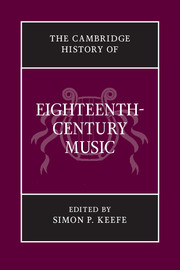Book contents
- Frontmatter
- PRELUDE
- PART I MUSIC FOR THE CHURCH
- INTERLUDE
- PART II MUSIC FOR THE THEATRE
- 8 Italian opera in the eighteenth century
- 9 Opera in Paris from Campra to Rameau
- 10 An instinct for parody and a spirit for revolution: Parisian opera, 1752–1800
- 11 German opera from Reinhard Keiser to Peter Winter
- 12 The lure of aria, procession and spectacle: opera in eighteenth-century London
- 13 Music theatre in Spain
- 14 Opera in Sweden
- INTERLUDE
- PART III MUSIC FOR THE SALON AND CONCERT ROOM
- POSTLUDE
- Appendix I Chronology
- Appendix II Institutions in major European cities
- Appendix III Personalia
- Index
- References
12 - The lure of aria, procession and spectacle: opera in eighteenth-century London
from PART II - MUSIC FOR THE THEATRE
Published online by Cambridge University Press: 28 March 2011
- Frontmatter
- PRELUDE
- PART I MUSIC FOR THE CHURCH
- INTERLUDE
- PART II MUSIC FOR THE THEATRE
- 8 Italian opera in the eighteenth century
- 9 Opera in Paris from Campra to Rameau
- 10 An instinct for parody and a spirit for revolution: Parisian opera, 1752–1800
- 11 German opera from Reinhard Keiser to Peter Winter
- 12 The lure of aria, procession and spectacle: opera in eighteenth-century London
- 13 Music theatre in Spain
- 14 Opera in Sweden
- INTERLUDE
- PART III MUSIC FOR THE SALON AND CONCERT ROOM
- POSTLUDE
- Appendix I Chronology
- Appendix II Institutions in major European cities
- Appendix III Personalia
- Index
- References
Summary
In 1789, Charles Burney described the operas of Henry Purcell – Dioclesian, King Arthur and The Fairy-Queen – as ‘differing from real operas, where there is no speaking’. Burney’s remark reflected his expressed preference for Italian music and (sub-consciously) his own failure as a composer to do anything other than produce a few insignificant ditties while apprenticed to the theatre composer Thomas Arne. But it is also a remark that has contributed to a skewed historical picture of late-seventeenth- and eighteenth-century opera in England that persists to this day – skewed, because for the majority of English theatre-goers, ‘real opera’ had spoken dialogue, and was a genre they preferred to the ‘foreign’ all-sung version. Yet despite this self-evident fact, it is Burney’s view that has come to dominate both English and non-English writings about opera in England. This situation has been compounded by the country’s inability to nurture to an internationally recognized level the musical talent that it clearly possessed, making it easy for those viewing England both from without and within the Austro-German tradition to dismiss the country as ‘the land without music’, and English opera as ‘a mass of insincerity’ lacking ‘the pure ideal which had been the guiding spirit of Peri and Monteverdi’, or (at best) as ‘light opera’ relying on ‘dramatic principles’.
- Type
- Chapter
- Information
- The Cambridge History of Eighteenth-Century Music , pp. 385 - 401Publisher: Cambridge University PressPrint publication year: 2009
References
- 2
- Cited by



